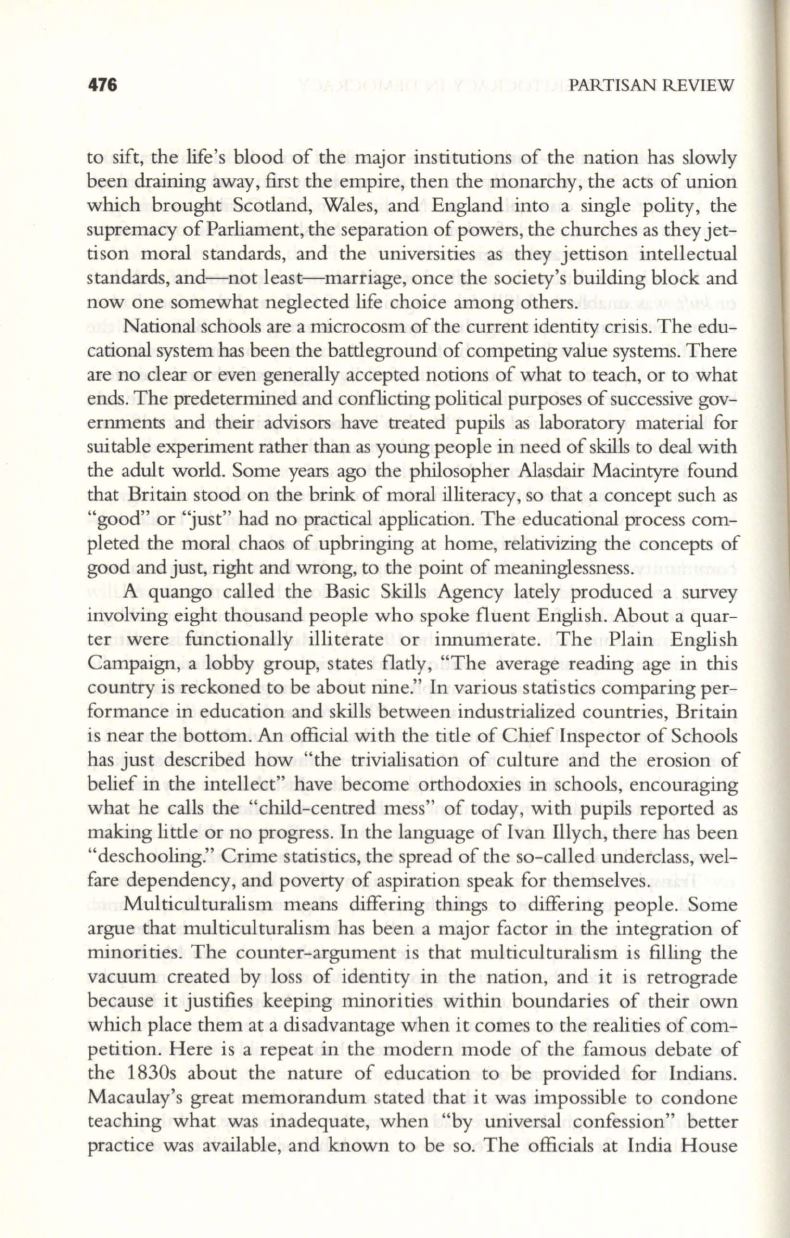
476
PARTISAN REVIEW
to sift, the life's blood of the major institutions of the nation has slowly
been draining away, first the empire, then the monarchy, the acts of union
which brought Scotland, Wales, and England into a single polity, the
supremacy of Parliament, the separation of powers, the churches as they jet–
tison moral standards, and the universities as they jettison intellectual
standards, and-not least-marriage, once the society's building block and
now one somewhat neglected life choice among others.
National schools are a microcosm of the current identity crisis. The edu–
cational system has been the battleground of competing value systems. There
are no clear or even generally accepted notions of what to teach, or to what
ends. The predetermined and conflicting political purposes of successive gov–
ernments and their advisors have treated pupils as laboratory material for
suitable experiment rather than as young people in need of skills to deal with
the adult world. Some years ago the philosopher Alasdair Macintyre found
that Britain stood on the brink of moral illiteracy, so that a concept such as
"good" or ''just'' had no practical application. The educational process com–
pleted the moral chaos of upbringing at home, relativizing the concepts of
good and just, right and wrong, to the point of meaninglessness.
A quango called the Basic Skills Agency lately produced a survey
involving eight thousand people who spoke fluent English. About a quar–
ter were functionally illiterate or innumerate. The Plain English
Campaign, a lobby group, states flatly, "The average reading age in this
country is reckoned to be about nine." In various statistics comparing per–
formance in education and skills between industrialized countries, Britain
is near the bottom.
An
official with the title of Chief Inspector of Schools
has just described how "the trivialisation of culture and the erosion of
belief in the intellect" have become orthodoxies in schools, encouraging
what he calls the "child-centred mess" of today, with pupils reported as
making little or no progress. In the language of Ivan Illych, there has been
"deschooling." Crime statistics, the spread of the so-called underclass, wel–
fare dependency, and poverty of aspiration speak for themselves.
Multiculturalism means differing things to differing people. Some
argue that multiculturalism has been a major factor in the integration of
minorities. The counter-argument is that multiculturalism is filling the
vacuum created by loss of identity in the nation, and it is retrograde
because it justifies keeping minorities within boundaries of their own
which place them at a disadvantage when it comes to the realities of com–
petition. Here is a repeat in the modern mode of the famous debate of
the 1830s about the nature of education to be provided for Indians.
Macaulay's great memorandum stated that it was impossible to condone
teaching what was inadequate, when "by universal confession" better
practice was available, and known to be so. The officials at India House


